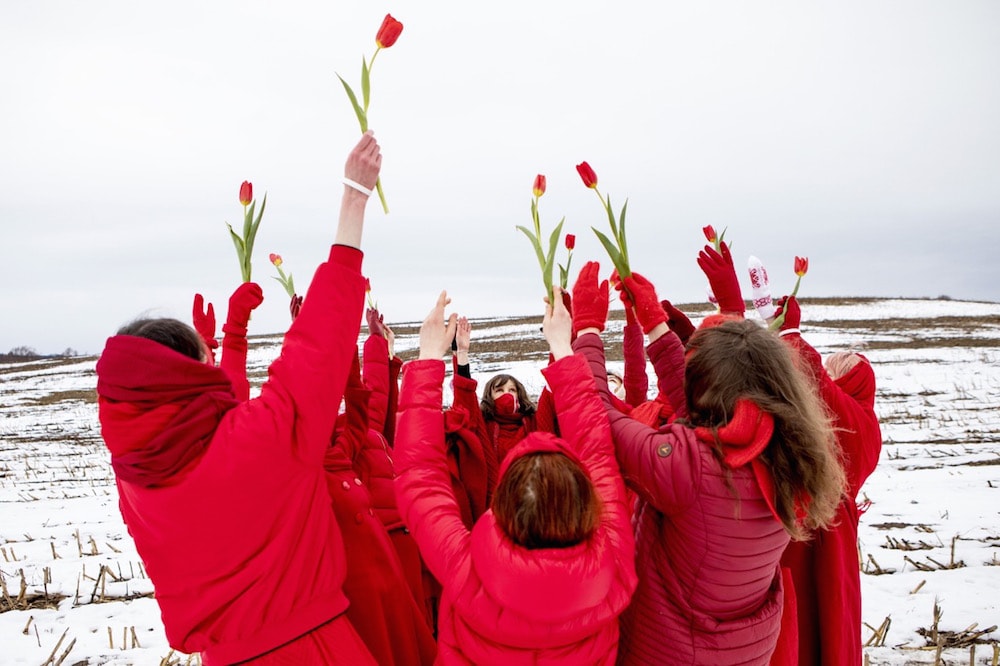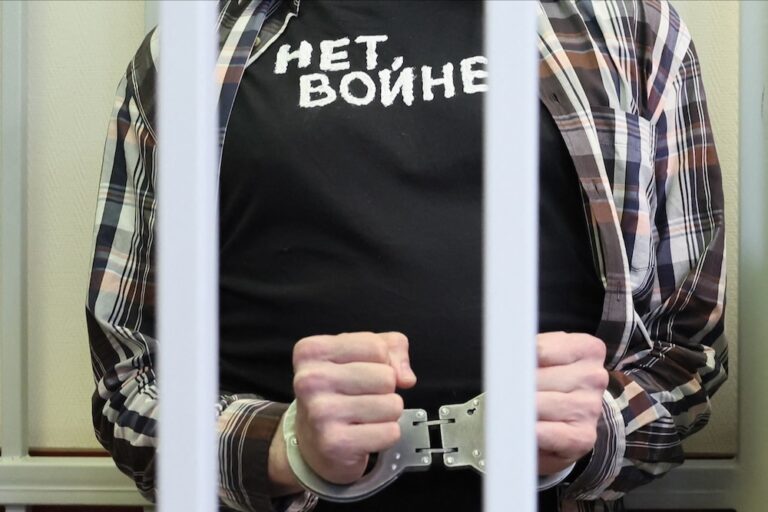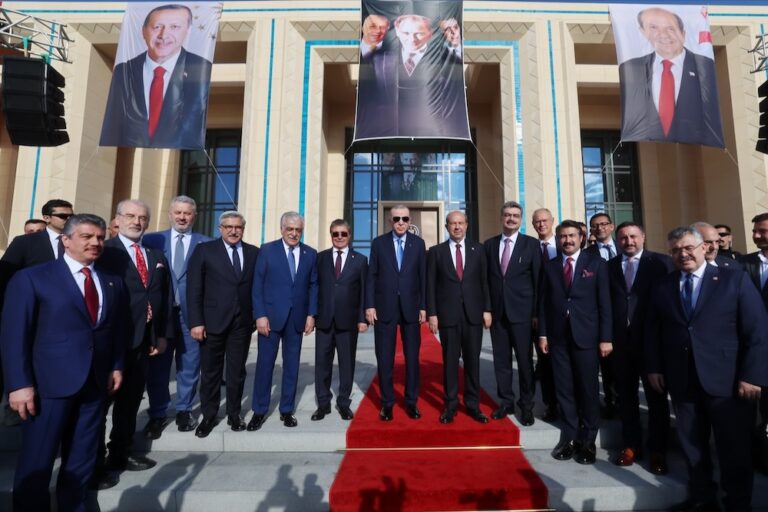March 2021 in Europe and Central Asia: A free expression round up produced by IFEX's Regional Editor Cathal Sheerin, based on IFEX member reports and news from the region.
March saw Turkey dismantling human rights protections and democratic norms, the promise of change – both good and bad – in Central Asia, and the launch of a new website devoted to tackling SLAPPs. It also saw IFEX members calling on the EU to confront Hungary, Poland and Slovenia’s attacks on media freedom, and important developments in the campaign to hold the Belarusian authorities accountable for human rights violations.
Holding Lukashenko’s regime to account
The repression of critical voices in Belarus is ongoing, and journalists, human rights defenders and civil society organisations continue to be targeted by the authorities. Local IFEX member the Belarusian Association of Journalists (BAJ) has been under pressure for months. In an article published this month, BAJ’s leadership describes this persecution, which has included office closures, home searches, police questioning and other harassment.
March saw numerous acts of solidarity and developments in the campaign to hold President Lukashenko’s regime to account for its appalling human rights violations:
- 25 March – “Freedom Day” – saw activists, politicians and journalists around the world engaging in public acts of solidarity with the people of Belarus. Peaceful Freedom Day celebrations resulted in 245 arrests in the country.
- Over 50 journalists’ organisations wrote to European heads of state, urging them to demand that Belarus release all jailed journalists, and asking them to appeal to the UN, the OSCE, the Council of Europe and the EU to take more action against the Belarusian authorities.
- The European Federation of Journalists, ARTICLE 19, and Human Rights Watch (HRW) joined other rights groups in calling on the UN Human Rights Council to “create a new mechanism assisting the process of accountability for human rights violations in Belarus”.
- The UN Human Rights Council adopted Resolution A/HRC/46/L.19 which requests the UN Human Rights Commissioner to collect and analyse information on the human rights situation in Belarus with regard to the 2020 presidential election and subsequent crackdown on opposition voices.
- Human rights groups led by the Danish anti-torture organisation DIGNITY launched an International Accountability Platform for Belarus; the project will bring together local and regional rights groups to document and verify evidence of human rights abuses. The initiative has been endorsed by 19 states.
- IFEX launched a new webpage, “Repression and resistance in Belarus: A monthly chronology”, which brings together all the updates from our monthly briefs detailing the work of our members and other actors, and highlighting other key developments in Belarus.
- Belarus was disqualified from taking part in Eurovision 2021 after it submitted two songs, both of which were deemed to have broken the rules by entering politicised songs (the first entry contained not-so-subtle pro-regime lyrics).
Some of the individual cases of persecuted activists or journalists that IFEX members highlighted this month included: journalist Katsiaryna Barysevich, who was jailed for six months over her coverage of protests; renowned translator Volha Kalackaja, who was sentenced to two years of house arrest on charges of “malicious hooliganism” (she had been held in pre-trial detention for two months); journalist Dzyanis Ivashin, who was arrested after he published a story about former Ukrainian riot police joining the Belarusian police force; and punk musician Ihar Bantsar, who was sentenced to 1.5 years’ restricted freedom on “hooligan” charges this month and released with a travel ban. Bantsar, who had been in jail since October 2020, had been on hunger strike for approximately two weeks.
For recent updates on how the crackdown is affecting Belarus’s cultural sector, take a look at PEN Belarus’s latest edition of Cultural Resistance in Belarus. For some legal analysis of the Belarusian authorities’ abuse of “extremism” and “hate speech” legislation to silence opposition voices, please see this report by ARTICLE 19 and Human Constanta. For more about the impact of Lukashenko’s crackdown on independent journalists and their families, see HRW’s recent report. Also, check out BAJ’s report on the persecution of Belarusian media in 2020, which looks at the situation before and after the presidential elections.
Turkey: “Partial justice”, dismantling human rights protections
Towards the end of the month, a court in Turkey convicted 27 of the 76 defendants accused in connection with the 2007 murder of journalist Hrant Dink. Most of those convicted were members of the state security forces or intelligence officials, and were handed prison sentences ranging from three years to life. Reporters Without Borders (RSF) described the verdict as “partial justice”, saying that full justice would not be done until all those involved were convicted.
Earlier in the month, Hazım Özsu, a local radio host in Bursa province, was shot dead at his home by a man who later said that he disliked some of the comments Özsu had made about religion on his radio programme. The suspect is in custody and has reportedly confessed to the murder.
HRW condemned Turkey for “dismantling human rights protections and democratic norms” following two recent disturbing developments. The first of these was Turkey’s abrupt withdrawal from the Istanbul Convention on preventing violence against women, which saw thousands of women take to the streets to demonstrate and protests by UN experts and the Council of Europe.
The second development was the chief prosecutor of the Court of Cassation’s move to close down the pro-Kurdish Peoples’ Democratic Party (HDP). This came after parliament expelled the HDP deputy Ömer Faruk Gergerlioğlu on the pretext of his conviction (and impending 2.5 year prison sentence) for a 2016 social media posting. In protest, Gergerlioğlu, who is well known for his human rights work, refused to leave parliament and was detained in his pyjamas just as he was preparing to pray.
Earlier in the month, President Erdoğan announced a Human Rights Action Plan for Turkey, which seems ironic considering his government’s ongoing crackdown on the press, social media, rights activists and civil society in general. The plan was criticised by rights defenders for its “lack of a clear implementation schedule, the exclusion of NGOs in the mechanism for protection of human rights, and failure to word the measures to be taken in concrete language”, all of which “raise doubts on the implementation of the plan”.
Central Asia: Steps forwards, steps backwards
A controversial new draft constitution will be put to a national referendum in Kyrgyzstan on 9 April; if the voters approve the new constitution it could be a big step backwards for rights and democracy. The draft was driven through parliament by the new president, Sadyr Japarov, a populist nationalist (who, until his supporters broke him out of jail last year, was serving a long prison sentence for kidnapping a local politician). HRW and the Media Policy Institute have warned that the draft constitution greatly increases the power of the president and erodes checks and balances. The OSCE Office for Democratic Institutions and Human Rights (ODIHR) and the Venice Commission of the Council of Europe have raised similar concerns.
In recent years, Uzbekistan has taken steps to improve its dreadful human rights record, though serious rights violations are still very common. A new draft Penal Code promises change, but not enough. HRW has noted some small but welcome improvements in the draft, but also points out that it “retains many provisions that violate the rights to freedom of speech, association, and religion”, while also falling short on protections for women and LGBTQI+ people.
Uzbekistan is one of only two countries in Europe and Central Asia (the other being Turkmenistan) where consensual sex between men is a crime. HRW called for decriminalisation this month, saying that the current situation leaves gay men vulnerable to “arbitrary detention, prosecution, and imprisonment as well as homophobia, threats, and extortion”. Uzbek social media has seen lots of debate about LGBTQI+ rights in recent days and 28 March saw a demonstration in the Uzbek capital, Tashkent, to protest against decriminalisation of consensual sex between men (even though there are no plans to decriminalise). On the same day, Miraziz Bazarov, a blogger who openly supports LGBTQI+ rights, was hospitalised after a brutal attack by a homophobic mob in Tashkent.
While a conservative, patriarchal, often homophobic outlook is dominant in the Central Asian states, women’s and LGBTQI+ rights activists are continually chipping away at change-resistant, traditional power structures, sometimes with success.
This month saw the authorities in Almaty, Kazakhstan, allow (for the first time) an International Women’s Day march to proceed. The marchers called for equality and respect for women’s rights, for the criminalisation of domestic violence, and for a new law on combating domestic violence that has stalled in parliament, to be adopted.
Next month, Kyrgyzstan’s local council elections will be an interesting test of its 2019 Gender Quota Law, which reserves 30% of the seats in each village council for women. In all, 9,800 women are running for positions in 448 local councils across the country, which means more than 2,800 of them are guaranteed to secure seats. In an article for The Diplomat, Colleen Wood acknowledges that the gender quota is “no panacea for the problems women face”, but argues that this “nudge” at including women in local politics “stands to challenge and shift gender stereotypes, to give women a chance to fight bride kidnapping and domestic violence head-on, and to gain much needed experience to run for higher level positions”.
Working together
In March, the Coalition Against SLAPPs in Europe (CASE) launched its website which is focused on tackling Strategic Lawsuits Against Public Participation (SLAPPs) i.e. gagging lawsuits that are used by the rich and powerful to intimidate into silence investigative journalists and activists. Over 100 rights and press groups (including IFEX and IFEX members) signed a joint statement to coincide with the launch, calling on the Council of Europe for a Recommendation to tackle the threat to freedom of expression posed by SLAPPs.
Multiple IFEX members joined other rights groups in calling on MEPs to reject the Terrorist Content Online Regulation, which will be debated in the European Parliament on 28 April. The groups argue that the Regulation poses serious threats to the rights to freedom of expression, access to information, privacy, and the rule of law. Details of its failings can be found here.
IFEX and IFEX members also joined other press freedom groups in calling on the EU to act in the face of threats to media freedom in Hungary, Poland and Slovenia. In a joint statement the groups describe how the Hungarian government, “through the misuse of legislative, regulatory and administrative tools has muzzled critical media while building a vast array of government cheerleaders that dominate the national media landscape”, thereby providing a useful model to Poland and Slovenia who are following the same dark path. Please check out the statement for a list of our recommendations.



